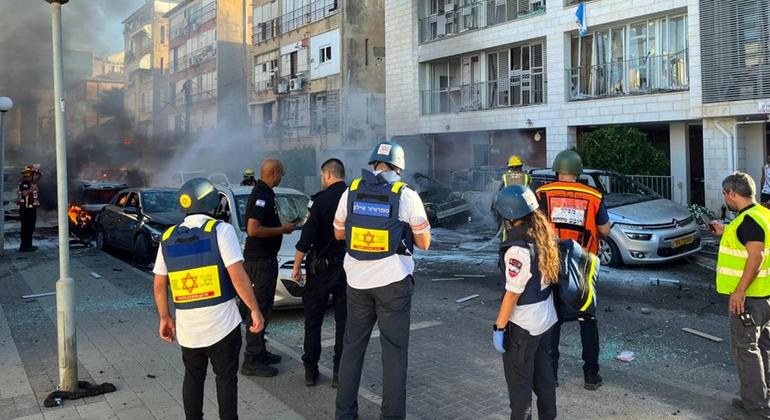

“That day left deep scars on individuals, families, and the collective memory of the State of Israel and the world,” said Tor Wennesland, UN Special Coordinator for the Middle East Peace Process, who is based in Jerusalem.
“Today, we mourn for the over 1,200 people, including many women and children, who were murdered in cold blood. Even a year later, the brutality is impossible to comprehend.”
Release all hostages
Mr. Wennesland added that more than 250 people were also abducted from Israel and taken into Gaza, and hostages continue to be held in abhorrent and unimaginable conditions.
“My thoughts are with the families and loved ones of those who were kidnapped. I carry their anguish with me every day,” he said.
The envoy reiterated his call for the immediate and unconditional release of all hostages held by Hamas and other militant groups. In the interim, they must be treated humanely and allowed visits from the International Committee of the Red Cross (ICRC).
Commit to peace
Adding that the war “continues to shatter lives and inflict profound human suffering for Israelis, Palestinians, and now the people of Lebanon”, he appealed for an immediate ceasefire to ensure the safety and security of all civilians.
“Violence begets violence, and in these moments of grief, we must reaffirm our commitment to peace,” he said.
In New York, the President of the UN General Assembly lamented that the Middle East “has been witnessing death, destruction and displacement for too long.”
Dialogue and diplomacy
Philémon Yang emphasized the need for an immediate ceasefire, the unconditional release of the hostages, and “a return to dialogue with a view to finding diplomatic solutions to the conflicts in the region.”
He added that no sustainable peace will be achieved military, and only a two-State solution based on the UN Charter, international law and relevant UN resolutions, can guarantee lasting peace and security for Israelis, Palestinians and the rest of the region.
“I call for all parties – Israel, Hamas, and Hezbollah – to abide by their obligations under international law, including international humanitarian law. I also urgently call for the protection of civilians and the unimpeded access to the much-needed humanitarian assistance,” he said.
Remembering survivors of sexual violence
Meanwhile, the Secretary-General’s Special Representative on Sexual Violence in Conflict, Pramila Patten, expressed heartfelt solidarity with the victims of the 7 October attacks, their families, and affected communities.
“Today we stand united in remembrance of those who lost their lives and in unwavering support of the survivors who bear the scars of that fateful day, in particular the victims of sexual violence, a heinous crime that has devastating physical and psychological impacts,” she said.
Ms. Patten recalled her mission to Israel earlier this year which concluded that conflict-related sexual violence, including rape and gang rape, was committed during the attacks in multiple areas across the Gaza periphery, and subsequently against hostages during captivity.
Furthermore, there are reasonable grounds to believe such violence against hostages may still be ongoing.
Call for justice
The UN expert voiced continued concern over the plight of hostages still in captivity and reiterated her call for their immediate, safe and unconditional release. She also urged political leaders and those with influence over the parties to step up efforts towards ensuring their release.
“A year since these heinous attacks, victims, survivors, and their families deserve justice. It is of vital importance to ensure fully-fledged independent investigations into all allegations of sexual violence during or in the aftermath of the 7 October attacks. My mandate stands resolute in its offer of support to the Israeli authorities, in the pursuit of justice and accountability”, she said.
Death, devastation, destruction
The UN humanitarian affairs office, OCHA, noted that the attacks were the deadliest in Israel’s history “- a horrific event that foreshadowed the devastation brought on by the Israeli response.”
The staggering toll includes the more than 1,200 Israelis and foreign nationals killed, and nearly 5,500 injured, while more than 41,000 people have been killed in the Gaza Strip, and 96,900 injured, according to the local Ministry of Health. Thousands more are believed to be trapped under the rubble.
Nearly everyone in Gaza has been displaced, many multiple times over, and there is nowhere safe to go. Civilians also face extreme deprivation, with limited or no access to healthcare, food, electricity or humanitarian aid, and children have missed an entire year of education.
At the same time, schools sheltering displaced families have been repeatedly shelled, healthcare workers and hospitals have been systematically attacked, and aid convoys have been continually blocked and even shot at, OCHA said.
Meanwhile, in the West Bank, the use of lethal force by Israeli forces, along with rampant settler violence and home demolitions, have led to a sharp increase in fatalities, widespread destruction and forced displacement.
Commitment to deliver
Over the past year, Israel has blocked humanitarian access both into and within Gaza, crippling aid operations. More than 300 aid workers have also been killed, the vast majority from the UN agency that assists Palestine refugees, UNRWA. OCHA said this is more than in any other single crisis, making Gaza the most dangerous place in the world for aid workers.
Yet despite the immense risks, humanitarians continue to deliver aid when and where they can. They have also vaccinated more than 560,000 young children against polio during the first phase of an emergency vaccination campaign.
OCHA said that although this represents an example of what can be achieved when aid workers can reach people in need, such examples are few.
“It has been 12 months of unrelenting tragedy – this must end,” said Joyce Msuya, UN Acting Under-Secretary-General for Humanitarian Affairs and Emergency Relief Coordinator.
“Member States must wield their influence to ensure respect for international humanitarian law and human rights and compliance with the rulings of the International Court of Justice. They must also work to end impunity. An immediate ceasefire and durable peace are long overdue.”